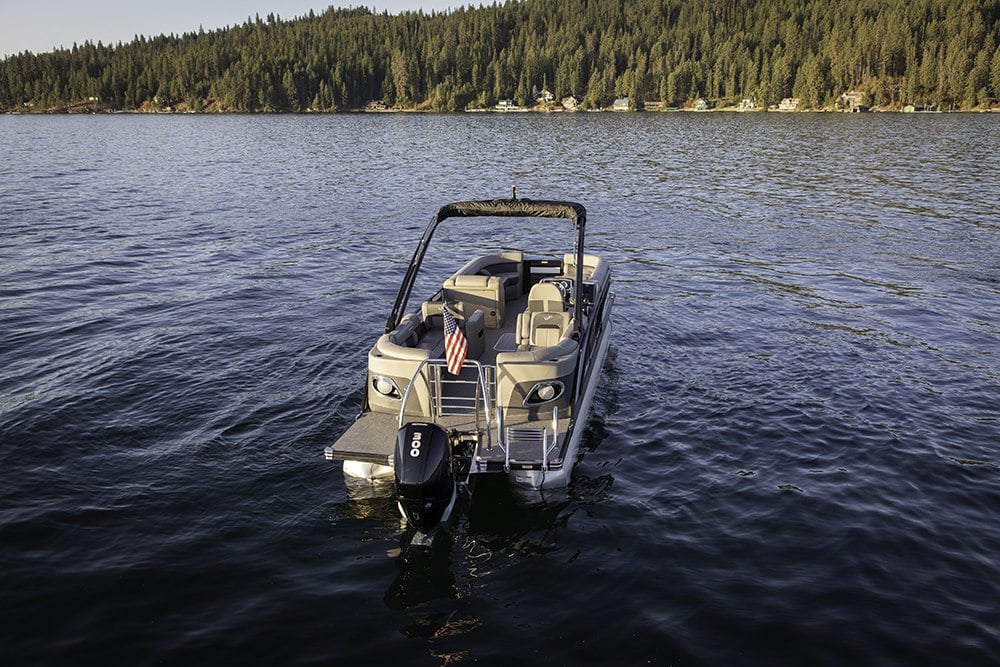How to Choose a Pontoon Boat Engine (6 Horsepowered Considerations)
So you’ve set your sites on a pontoon boat for the upcoming boat season. You have spent hours Googling and researching different brands online.
While narrowing down your perfect on-water scenario, you have found a few different floorplans that will meet your needs and keep the family happy while boating.
If you have figured out what length, layout, and class of pontoon you’re looking to buy, there’s one huge piece of the puzzle that is still up in the air.
If you’re ready to pull the trigger on that new pontoon boat, you must figure out what size engine you’re going to put on it, but how do you know which one to choose?
You will find a wide variety of horsepower options ranging from 9.9-600. With the evolution of today’s performance pontoon boats, outboard motors have grown up and offer speeds never seen before for this type of boat.
When choosing an engine for your pontoon boat, there are so many factors to consider such as:
- Dealer recommendations
- Size and capacity
- Boat activities
- Water conditions
- Boat components
I’m going to break this list down to help you understand what variables to consider when choosing an engine for your pontoon boat.
1. Talk to Your Dealer
This should be your very first step before deciding what size engine your pontoon will need. Talk to your dealer about what your day on the water looks like, ask them what boat/engine combination they recommend.
Tell your dealer how you’re planning to use the boat. Are you water skiing? Cruising? Floating? Engine size will make all the difference depending on what your day on the water looks like.
From this, what are your goals? If you’re a serious waterskier, you may need an engine that offers quicker takeoff and gets on plane faster.
Is speed the most important element of your boating experience? If you’re looking to be the fastest boat on the lake, you might start shopping around 250 HP instead of the typical entry-level tritoon with 150HP.
Talk about the body of water where you plan to boat. If it’s small you may not want a huge engine. Some lakes even have speed restrictions making a large motor unnecessary.
On the contrary, if you will be traveling long distances by boat, a large engine may be imperative so that one trip doesn’t take all day. Luckily, outboard manufacturers have come a long way in offering a wide variety of horsepower options.
2. Size of the Boat
The size of the pontoon you choose will be a key consideration point when pairing it with an engine. You must take into consideration dry weight, length, and the capacities allotted.
Dry weight is how much the boat weighs empty. Meaning, you have no fuel, no gear, and no people on board.
As soon as you begin to add weight to the boat, you will lose speed. A full tank of gas and maxed-out person capacity will make for a slower ride than two people on board and half a tank of gas.
Keep in mind the size crew that you will have on the boat if you’re looking to hit a certain speed. You may be surprised how much of a speed reduction you will get by filling up the boat.
The length of the hull can make a difference in speed as well. Oftentimes, a bigger boat is a faster boat. This is true because you have more hull up on plane, which means you have more surface area on top of the water.
With more boat on top of the water, it catches air and acts as a tunnel hull. The trapped air gives the boat more lift creating less drag and more speed.
If you choose a smaller-sized pontoon boat, you may only be able to shop within the allotted engine choices. Most manufacturers will put a cap on how large of an engine you can choose if you are planning on buying a short, small floorplan.
They do this because it can be dangerous to put a big engine on a small boat. That said, if you’re shopping for a short bitoon, a small engine in the 100-150HP range should be plenty.
You can put as small of an engine as you want on any size boat. This comes in handy if you want a pontoon big enough for a large crew but your lake has speed restrictions.
Large tritoon models typically go hand-in-hand with higher horsepower motors, so you will get a wider range of choices. This will also have bearing on what type of steering you choose.
If you’re looking for an entry-level price point boat/engine combo, a bitoon with 115HP will be a good starting point. This combination will get you on the water with just about any budget.
The typical entry-level performance pontoon is a tritoon with a 150HP engine. This combination is a good place to start if you’re on big water or have a large crew.
3. Boating Activities
A few points I mentioned above will help shed some light on how different activities will result in different sized engines.
If you’re planning on doing some serious water sports behind the pontoon boat, you should consider starting at 150HP.
Anything smaller won’t give you the oomph you need to get up on skis. Having a faster, stronger engine will help with take-off and planing out.
If you’re looking for a family cruiser to enjoy a sunset ride, you might consider something in the 100HP range. You may be surprised how much power you can get out of 150HP if your main interest is taking in the sites.
On the contrary, if you have the need for speed and want to get from point A to point B quickly, there are options that range up to 600HP. You may even be interested in a dual-engine pontoon boat if speed is your main concern.
4. Water Conditions
The body of water that you plan to boat on will have an impact on the speed you get out of the engine you choose. This can be an afterthought when shopping for the right motor but it should be taken into consideration.
As I mentioned, high horsepower engines pair well with large pontoon and tritoon boats. But what if there are speed restrictions on your lake? You can put as small of an engine as you want on a pontoon boat.
This would be the case if you need a big enough floorplan to fit all of your family and friends but are capped on how fast you can go on the water near you. Know your local boating laws before you purchase the engine, it may pay off.
It will also be helpful if you know what the water conditions are on a regular basis. Are you boating on a river with a heavy current? Are you on big water with tall waves? Is the lake really shallow?
All of these things should be taken into account when choosing an engine. Big water and heavy chop may require more horsepower whereas a small, shallow lake may not need that large of an engine.
The elevation of an area also matters. For instance, the elevation at Lake Tahoe knocks about 10 MPH off the speed. Our owners in these mountain lake areas have to upsize and supercharge engines just to make up for the natural reduction.
Another factor to think about is if you boat in salt water or fresh water. Some may not realize this but salt water is more buoyant and in turn, your boat will naturally go faster in salt water than it will fresh water.
There are many variables regarding the water that you boat in that can change the output of the engine you choose. Make sure to talk through these things with your dealer, they will help guide your purchase.
5. Boat Components
There are a few components on board that can affect the speed you will get from an outboard engine. I want you to have a heads up on these factors so that you can tailor your expectations when using the boat.
Every boat brand and engine combination will perform differently. You may find that your brand A pontoon goes 2 MPH faster than your friend’s brand Z pontoon with the same engine.
The difference may be subtle but if you’re expecting the exact same results, you might be surprised. Every brand, make, and model is built with different components, dry weights, and structures. This all plays a part in how much speed you can get out of the motor.
The type of propeller that is on the engine has a substantial effect on performance. Talk to your dealer and discuss different prop options and which is best for your boat/engine combo.
Having your bimini deployed while underway will impact how fast you should be going and create resistance against the wind which will lead to a reduction in speed. Check your owner’s manual to find the speed recommendation with the bimini deployed.
Something that’s not widely known is that marine growth can greatly affect the boat’s performance. Marine growth and buildup on the bottom of the toons can reduce your boat’s speed by up to 7 MPH.
To combat this, make sure to regularly clean your toons. Even while the boat is in the water, jump in with a scrub brush to clean away speed-reducing buildup.
Which Engine to Choose
With all those factors in mind, I hope you have some clarity on what impacts the engine’s performance. Knowing these points will guide your decision on a range of horsepower.

Price is another consideration factor and is dependent on the brand of engine and amount of horsepower. Here’s a range of ballpark pricing that may give you some idea of where you stand.
A 9.9HP starts around $4,600, before rigging and steering options. The opposite end of the price spectrum is a 450HP that starts around $80,000 before rigging and steering are added.
There is a 600HP outboard engine that just hit the market, pricing will follow shortly. That said, you can shop any horsepower engine by using a boat manufacturer’s build-a-boat site.
That’s a great way to understand price differences if you’re on the fence about gaining that extra 50HP or not.
Other Helpful Articles



.png?width=700&name=BUILD%20(2).png)